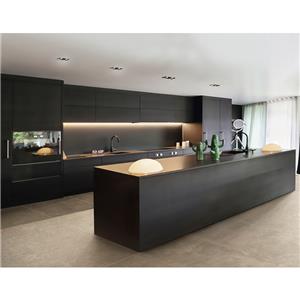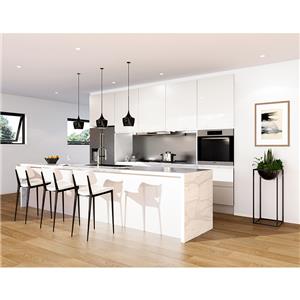How to Selecting The Right Countertop Thickness?
When it comes to selecting a new countertop for your kitchen or bathroom, there are many factors to consider. One important aspect is the thickness of the countertop. Choosing the right thickness can impact the overall look and feel of your space, as well as the durability and functionality of your countertop. Here are some tips on selecting the right countertop thickness for your needs.
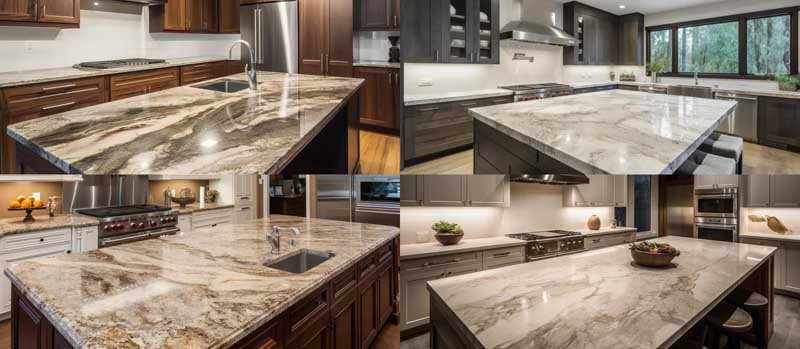
Consider the Material
Different countertop materials have different recommended thicknesses.
Granite, marble, and quartz are the most common countertop materials. There are industry standards for their thickness.
Granite - 2 cm and 3 cm
Marble - 2 cm and 3 cm
Quartz - 2cm and 3 cm
Consider the Style
The style of your space can also play a role in determining the right thickness for your countertop. For example, a thicker countertop can give a more substantial, high-end look, while a thinner countertop can provide a sleek, modern appearance. Consider the overall style of your kitchen or bathroom, as well as any other design elements such as cabinetry, flooring, and lighting when selecting the thickness of your countertop.
Consider the Functionality
The functionality of your countertop is another important consideration when selecting the thickness.
A thicker countertop can provide more durability and resistance to wear and tear, making it a good choice for high-use areas such as kitchens. Thicker countertops can also be more heat resistant, which is important for those who do a lot of cooking.
However, thicker countertops can be heavier and more difficult to install, so it is important to consider the weight-bearing capacity of your cabinetry and any structural support that may be required.
Consider Your Budget
Finally, it is important to consider your budget when selecting the thickness of your countertop.
Thicker countertops can be more expensive due to the additional material and labor required for installation. If cost is a concern, consider selecting a thinner countertop or a less expensive material that is still suitable for your needs.
There is typically a 20% to 40% difference in material costs between 2cm and 3cm panels.
In conclusion, selecting the right countertop thickness requires careful consideration of the material, style, functionality, and budget. By taking these factors into account, you can choose a countertop that not only looks great but also provides the durability and functionality you need for your space.
Quartz Countertop Thickness
Quartz countertops are typically available in two thickness options: 2cm (3/4 inch) and 3cm (1 1/4 inch). While the thickness difference may seem insignificant, it can make a substantial impact on the overall look and performance of the countertop.
| 2cm quartz counter | 3cm quartz counter |
|---|---|
| Thinner and lighter | Durable |
| Less expensive | Resistant to chipping and cracking |
| Requires additional support | Requires additional support |
| Susceptibility to chipping and cracking | Thicker and heavier |
| Expensive |
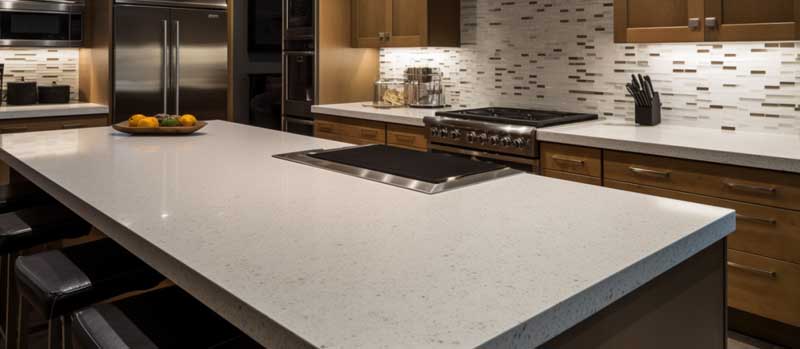
A 2cm quartz countertop is thinner and lighter than a 3cm countertop. It's an ideal option for those who prefer a sleek and minimalist look. This thickness is also a practical choice for those on a tight budget as it's usually less expensive than its thicker counterpart.
However, one disadvantage of a 2cm quartz countertop is its susceptibility to chipping and cracking. Because it's thinner, it's more prone to damage from heavy use and accidental impact. It also requires additional support from the cabinetry below, which can add to the installation cost.
On the other hand, a 3cm quartz countertop is thicker and heavier than a 2cm countertop. It offers a more substantial and luxurious appearance and is a perfect option for those who desire a high-end look. It's also more durable and resistant to chipping and cracking, making it an ideal choice for high-traffic areas.
However, a 3cm quartz countertop is more expensive than a 2cm countertop, and its weight can make it challenging to install. It may require additional support from the cabinetry below, and the weight may cause stress on the underlying structure.
In addition to the two standard thickness options, some manufacturers offer customized thickness options to meet specific needs. This option lets you choose a thickness that fits your specific design preferences, needs, and budget.
Granite countertop thickness
Granite countertops are an elegant, durable, and sought-after choice for kitchen surfaces. With their natural beauty and resilience, it’s no wonder why granite has become the go-to material for kitchen countertops. But how thick should a granite countertop be?
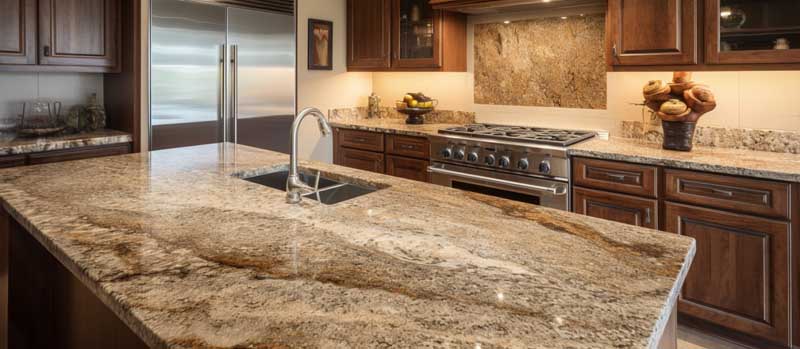
The answer depends on the type of granite you’re using and the purpose the countertop serves. The average thickness of a granite countertop is 2cm to 3cm. However, depending on your project, you may need a thicker countertop. For example, if you’re installing a granite countertop as a support for a large sink or stove, you may want to choose a thicker slab.
If you’re installing a granite countertop as a functional surface, you’ll want to consider the amount of weight it will need to support. For example, a kitchen countertop that will be used for food preparation should be a minimum of 3cm thick. This ensures that the countertop is strong enough to withstand the weight of large pots and pans.
In general, the thicker the granite countertop, the more expensive it will be. However, this investment pays off in the long run, as thicker countertops are more resilient and will last longer.
No matter what type of granite countertop you choose, it’s important to consider the thickness of the slab before purchasing. The right thickness will ensure that your countertop is strong and durable enough to withstand everyday use.
Marble countertop thickness
The marble top is available in 2cm and 3cm thicknesses
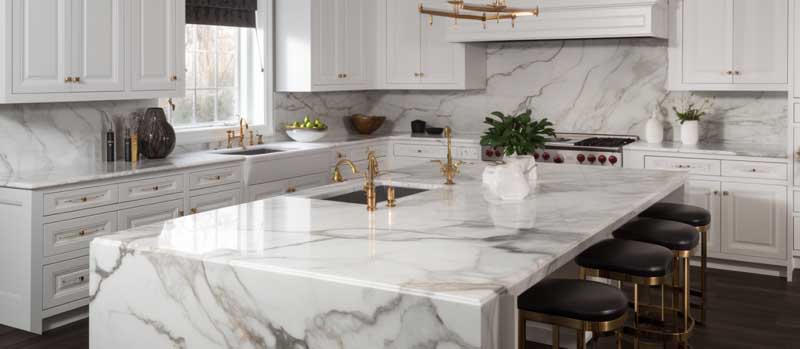
2 cm marble top
A 2 cm marble countertop should be fitted with a plywood base. It's often used on backsplashes and surfaces that don't get much daily use, such as bathroom countertops.
3 cm marble top
The 3 cm marble top is durable enough not to require a plywood plinth on the base cabinet as a backup support system. It's perfect for use in heavily used kitchens.
2 cm VS 3 cm
A 3cm marble slab is 20%-40% more expensive than a 2cm marble slab. The industry standard for marble slabs are 2 cm for bathroom countertops and 3 cm for kitchen countertops.
Before installing the 2cm marble countertop, a plywood base needs to be placed under the marble slab. A 3 cm marble slab is strong enough, eliminating the need for a plywood base.
Does marble need to be thicker than granite?
Marble and granite are two of the most popular countertop materials because they are durable stones. However, granite is harder than marble.
Granite is a better choice than marble if you want a thinner countertop. Marble is softer than granite and scratches and chips more easily than granite. Yes marble needs to be thicker than granite as it is less durable
Can I go thinner than 2cm?
Yes, granite slabs are available in 1 cm thickness, which is thinner than the usual 2 cm thickness. However, thin granite slabs are more prone to damage and require additional support, such as for the overhang, as they are less durable. Nevertheless, thinner slabs come at a lower cost. If you're looking for an even thinner countertop material, there are other options available.
Concrete countertops thickness
Concrete countertops have become increasingly popular in recent years due to their unique and customizable designs. However, one important factor that must be taken into consideration when planning a concrete countertop project is the thickness of the countertop.
The thickness of a concrete countertop can vary depending on several factors, including the intended use of the countertop, the design aesthetic, and the type of reinforcement used.
Generally, a typical concrete countertop thickness ranges from 2 to 3 inches. This thickness is typically suitable for most residential and commercial applications. However, thicker countertops may be required for certain applications such as heavy-duty kitchen use or outdoor use.
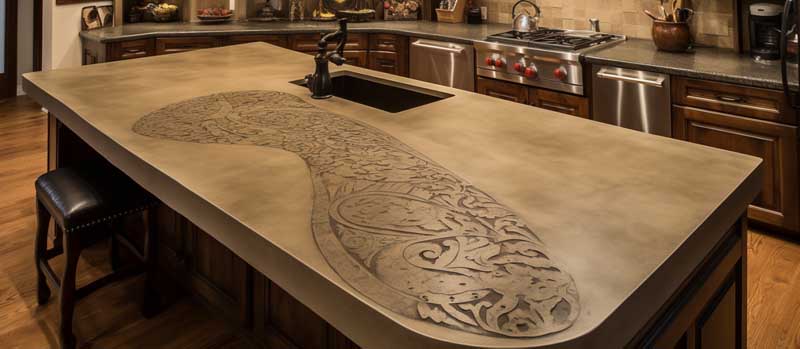
One of the main factors that can impact the thickness of a concrete countertop is the reinforcement used. Reinforcement can be added to concrete countertops in the form of steel or glass fibers, or even rebar. The addition of reinforcement can allow for a thinner concrete countertop while still maintaining the necessary strength and durability.
In addition to the functional requirements of a concrete countertop, the thickness can also play a role in the overall design aesthetic. Thicker countertops can provide a more substantial and dramatic look, while thinner countertops can provide a more modern and sleek appearance.
When designing a concrete countertop, it is important to work with a professional who can help determine the appropriate thickness based on the intended use and design aesthetic. It is also important to consider the weight of the countertop, as thicker countertops can be significantly heavier and may require additional support.
Overall, the thickness of a concrete countertop is an important consideration that can impact both the functionality and design of the final product. By working with a professional and considering all relevant factors, homeowners and business owners can ensure that their concrete countertops meet their specific needs and aesthetic preferences.
Thickness of wood and butcherblock countertop
Wood countertops are a classic and timeless choice that can bring warmth and character to any space. The thickness of wood countertops can vary depending on the type of wood used and the style of the countertop. Generally, wood countertops range from 1 inch to 6 inches in thickness. Thicker countertops can provide added durability and strength, making them a great choice for high-traffic areas or heavy use. However, thicker countertops may also be more challenging to install and may require additional support or reinforcement.
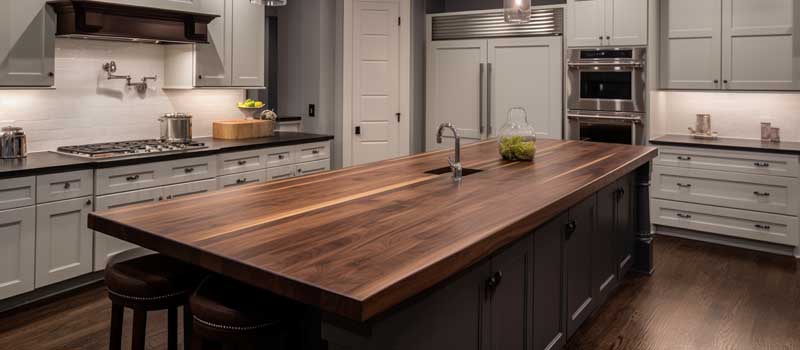
Butcherblock countertops, on the other hand, are specifically designed for durability and functionality. Butcherblock is made by gluing together thin strips of wood, creating a strong and sturdy surface. The thickness of butcherblock countertops can vary from 2 inches to 12 inches, with thicker countertops being better suited for heavy use and commercial settings.
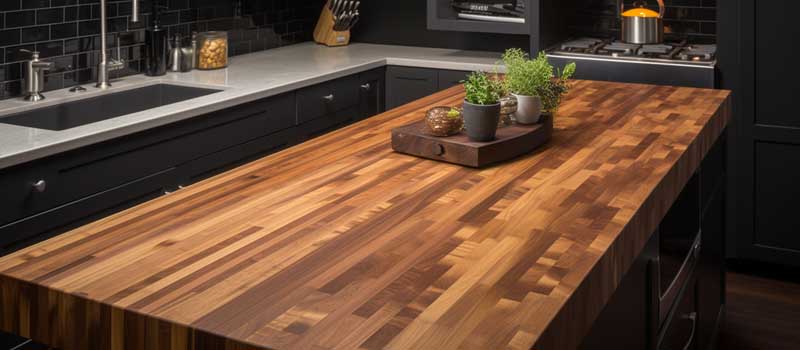
The thickness of wood and butcher block countertops depends on how they are constructed.
Edge Grain Wood Tops
This countertop is made of wood planks on two sides, glued with narrower edges as the surface. This is ideal for long kitchen counters. With this method of construction, the thickness of the countertop should be between 1.5 inches and over 8 inches.
Telomere
This style of construction requires countertops to be at least 2.5 inches thick. The countertop is made from several pieces of edge-grained wood that form a glued grid. This countertop has a checkerboard look.
Face lines
Grain, slab, or plain grain countertops should be between 4 inches and 12 inches wide and approximately 1 1/2 inches thick.
In addition to thickness, there are other factors to consider when choosing a wood or butcherblock countertop. The type of wood used can impact the durability and appearance of the countertop. Hardwoods like maple, oak, and cherry are popular for their strength and beauty. The finish of the countertop can also impact its durability and maintenance requirements.
Ultimately, the thickness of your countertop will depend on your specific needs and preferences. If you want a classic and timeless look, a 1-inch to 2 ½ inch thick wood countertop may be a perfect choice. If you require added durability and strength, a thicker butcherblock countertop may be a better fit. Whatever your preference, be sure to choose a reputable and experienced contractor for installation to ensure a beautiful and functional countertop that will last for years.
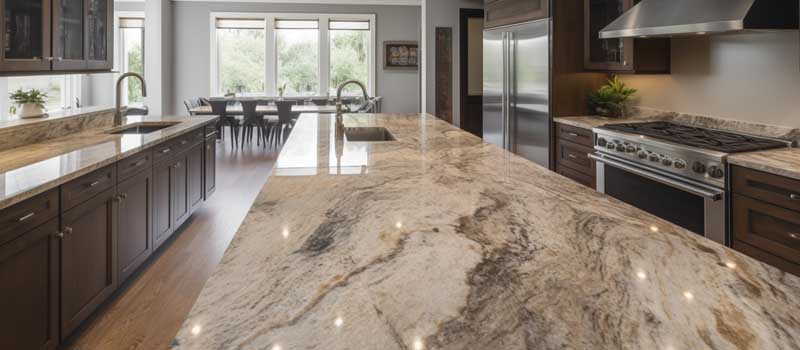
How to Avoid Mistakes When Choosing Kitchen Countertops?
Choosing the right kitchen countertop can be a daunting task, but with some careful planning and consideration, you can avoid making common mistakes. Here are some tips to help you choose the best countertop for your kitchen:
Consider your budget: One of the biggest mistakes people make is not considering their budget before choosing a countertop. There are various options available at different price points, so be sure to set a budget and stick to it.
Think about durability: The kitchen is one of the most heavily used areas in the home, so it's important to choose a countertop that is durable and can withstand daily wear and tear. Some popular options include granite, quartz, and solid surface materials.
Consider maintenance: Some countertop materials require more maintenance than others, so think about how much time and effort you're willing to put into cleaning and upkeep. For example, natural stone countertops may require regular sealing to maintain their appearance.
Consider lighting: When your kitchen has less natural light, a lighter-colored countertop with some gold accents or light patches and spots is recommended. If your kitchen space is surrounded by natural light, consider using a darker color for your countertops.
Choose a thickness: 3 cm is the preferred thickness for quality materials such as stone and granite, and 1 or 2 cm for materials such as laminate, wood, and glass.
Think about style: Your countertop should complement the overall style of your kitchen. Think about the colors, textures, and patterns that will work well with your cabinets, flooring, and backsplash.
Get samples: Don't decide based solely on online photos or showroom displays. Get samples of your top choices and see how they look in your kitchen's lighting and alongside your other design elements.
Consider resale value: If you plan on selling your home in the future, keep in mind that certain countertop materials may appeal more to potential buyers than others. It's worth researching popular countertop materials in your area and what buyers are looking for.
By taking the time to carefully consider your options and weighing the pros and cons of different materials, you can avoid making mistakes when choosing kitchen countertops and ensure you end up with a durable, functional, and stylish surface that will serve your needs for years to come.
Countertop thickness FAQs
What is normal countertop thickness?
Normal countertop thickness is usually between 1.5 and 2 inches (3.8 and 5 cm). However, depending on the material, the thickness can range from 0.75 to 2.5 inches (1.9 to 6.4 cm).
Is a 2cm countertop too thin?
It depends on the purpose. For general use, 2cm may be too thin. However, for a countertop that will be used for decorative purposes, 2cm may be acceptable.
Related articles
Kitchen Cabinet Materials: Total Guide
Pros and Cons of Butcher Block Kitchen Countertops
Granite Kitchen Cabinet Countertop: Pros and Cons
Quartz Kitchen Cabinet Countertop: Pros and Cons
Marble kitchen cabinet countertop: pros and cons



